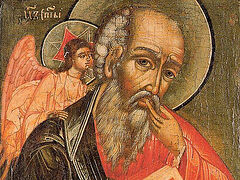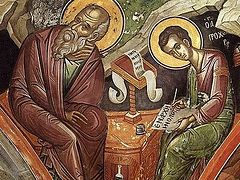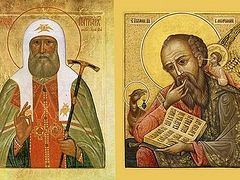The Holy Apostle and Evangelist John is preeminently called a theologian before the other Apostles by reason of his most obvious confession of God the Word as God, and the heights of his contemplation and depths of his knowledge of the mysteries of the Kingdom of God. Therefore, the day dedicated to his memory is most appropriate for studying theology, and studying it precisely with him.
Blessed are those who heard his word by mouth in Jerusalem, Cyprus, Ephesus, Patmos, and in the churches of Asia Minor. But we also have the opportunity to join the ranks of his disciples. We have before us his Apostolic epistles. Let us open them and internalize the truths contained in them. We will thus receive an entire course of Christian theology in its essential features. If all the truths contained in the epistles of St. John the Theologian are brought together, then they could be summarized in the following order (come and listen as though you were standing before his own pulpit).
According to his nature and the character imprinted in him, man is intended to be in communion with God. This is his Eternal Life, his life full of joy (1 Jn. 1:3-4). But God is light, and in Him is no darkness at all (1 Jn. 1:5). Therefore, in order to be in communion with Him, we must walk in the light, as He is in the light (1 Jn. 1:7). He who walks in darkness ceases to have communion with God, and if he says that he has this communion, he does not the truth (1 Jn. 1:6).
As long as our forefathers walked in the light of God’s will, they were in communion with God; but when they came to love the darkness of their own desires, they fell into sin and ceased to be in God. And in them we also fell into the same darkness and away from communion with God. This is such an immutable truth that he who does not confess it, who says that we have not sinned, makes God Himself a liar, and His word is not in him (1 Jn. 1:10). No. If we say that we have no sin, we deceive ourselves, and the truth is not in us (1 Jn. 1:8).
But in sin there is death and destruction. What does the love of God do? The Father sent the Son to be the Saviour of the world (1 Jn. 4:14). God sent His only begotten Son into the world, that we might live through Him (1 Jn. 4:9). Behold, God’s love for us! We couldn’t endure in love, but He never stopped loving us, and sent His Son to be the propitiation for our sins (1 Jn. 4:10). Now, we have an advocate with the Father, Jesus Christ the righteous: And He is the propitiation for our sins: and not for ours only, but also for the sins of the whole world (1 Jn. 2:1-2). He appeared to take away our sins and destroy the works of the devil (1 Jn. 3:5, 8). In Him is life, and He was with the Father, and was manifested unto us (1 Jn. 1:2).
Thus, God hath given to us eternal life, and this life is in His Son (1 Jn. 5:11). From now on, such is the law of God’s righteousness and love, that He that hath the Son hath life; and he that hath not the Son of God hath not life (1 Jn. 5:12). For he who has the Son has both the Father and the Spirit (1 Jn. 2:23, 3:24, 4:13)—God is Triune, in Whom is the fount of Life.
Such are the laws of communion with God, and these are its advantage and fruits: Those who dwell in God are called and are sons of God, who, as born of God doth not commit sin (1 Jn. 3:1, 9, 5:18). For His light abides in them (1 Jn. 2:24), and they always bear the fruit of righteousness according to their nature. If anyone sins, the Blood of the Son of God cleanses him from all sin (1 Jn. 1:7). He who confesses his sins is absolved of them, and he is cleansed from all unrighteousness (1 Jn. 1:9). Therefore, those who abide in Him, when He appears, will not be ashamed before Him at His coming, but will have boldness before Him in the Day of Judgment (1 Jn. 2:28, 4:17), for this is the promise that He hath promised us, even eternal life (1 Jn. 2:25).
Such is the blessed end of communion with God! Having been vouchsafed this gift, let us make an effort to remain in Him. He who wants to be in unceasing communion with God must keep His word (1 Jn. 2:5). Only he that keepeth His commandments dwelleth in Him, and He in him (1 Jn. 3:24). And His commandments are not grievous (1 Jn. 5:3). And this is His commandment, That we should believe on the name of His Son Jesus Christ, and love one another, as He gave us commandment (1 Jn. 3:23).
The first commandment: Let us believe in the Son of God. Whosoever shall confess that Jesus is the Son of God, God dwelleth in him, and he in God (1 Jn. 4:15). Whoever wants to please God without the Lord Jesus Christ, let him hear the judgment against him—only he who has the Son has the Father. And Whosoever denieth the Son, the same hath not the Father. So he who rejects that Jesus is the Christ, rejects the Father and the Son. And He is antichrist (1 Jn. 2:22-23). Whoever does not believe in the Son, makes a “liar” out of God Himself, because he believeth not the record that God gave of His Son (1 Jn. 5:10). So, all that you have heard from the beginning—may it abide in you! If that which ye have heard from the beginning shall remain in you, ye also shall continue in the Son, and in the Father (1 Jn. 2:24). For Whosoever transgresseth, and abideth not in the doctrine of Christ, hath not God. He that abideth in the doctrine of Christ, he hath both the Father and the Son (2 Jn. 1:9).
The second commandment: Let us love one another. He who abideth in Christ ought himself also so to walk, even as He walked (1 Jn. 2:6). And He laid down His life for us (1 Jn. 3:16). Thus, Beloved, if God so loved us, we ought also to love one another (1 Jn. 4:11). God is love; and he that dwelleth in love dwelleth in God, and God in him (1 Jn. 4:16). He deceives himself who says: “I love God, and that’s enough.” No. The commandment is such that he who loves God must also love his brother. For he that loveth not his brother whom he hath seen, how can he love God Whom he hath not seen? (1 Jn. 4:20).
He also deceives himself who says: “I will love the brethren, and that’s enough.” No. The law is such that only he who loves God truly loves the sons of God (1 Jn. 5:2). He that loveth not his brother abideth in death. Therefore, We know that we have passed from death unto life, because we love the brethren. Whosoever hateth his brother is a murderer: and … hath no eternal life abiding in him (1 Jn. 3:14–15). Thus, brethren, it is only when we love one another [that] God dwelleth in us, and His love is perfected in us (1 Jn. 4:12). Beloved, follow not that which is evil, but that which is good, knowing that he that doeth good is of God: but he that doeth evil hath not seen God (3 Jn. 1:11). But whoso hath this world’s good, and seeth his brother have need, and shutteth up his bowels of compassion from him, how dwelleth the love of God in him? My little children, let us not love in word … but in deed and in truth (1 Jn. 3:17-18).
Such is the bright, blessed brotherhood of the sons of God. Those who do not believe in the Lord Jesus Christ, who do not receive His teachings, or receive them but are alien to His spirit in life and disposition of heart, constitute the pernicious world, which lieth in darkness (1 Jn. 5:19), which thinks evil, works evil, and teaches others to do evil. Brethren! Love not the world, neither the things that are in the world. If any man love the world, the love of the Father is not in him. For all that is in the world, the lust of the flesh, and the lust of the eyes, and the pride of life, is not of the Father, but is of the world. And the world passeth away, and the lust thereof: but he that doeth the will of God abideth for ever (1 Jn. 2:15–17).
Beloved, believe not every spirit, but try the spirits whether they are of God: because many false prophets are gone out into the world. Hereby know ye the Spirit of God: Every spirit that confesseth that Jesus Christ is come in the flesh is of God: And every spirit that confesseth not that Jesus Christ is come in the flesh is not of God: and this is that spirit of antichrist, whereof ye have heard that it should come; and even now already is it in the world (1 Jn. 4:1-3). Little children, it is the last time: and as ye have heard that antichrist shall come, even now are there many antichrists… They went out from us, but they were not of us (1 Jn. 2:18-19). Whoever comes to you from such and does not bear the true teaching of Christ, receive him not into your house and do not rejoice in him, so as not to become partner to his evil deeds.
They are of the world: therefore speak they of the world, and the world heareth them. We are of God: he that knoweth God heareth us; he that is not of God heareth not us. Hereby know we the spirit of truth, and the spirit of error (1 Jn. 4:5–6). That which we have heard with our ears, what we have seen with our eyes … and our hands have handled, we announce to you of the Word of life. For the life was manifested, and we have seen it, and bear witness, and shew unto you that eternal life… That which we have seen and heard declare we unto you, that ye also may have fellowship with us: and truly our fellowship is with the Father, and with His Son Jesus Christ (1 Jn. 1:1–3).
And God Himself testified of Him. If we receive the witness of men, the witness of God is greater. Everyone that believeth on the Son of God hath the witness in himself (1 Jn. 5:9-10). He who stands in the truth knows the truth. But ye have an unction from the Holy One, and ye know all things (1 Jn. 2:20). But the anointing which ye have received of Him abideth in you, and ye need not that any man teach you: but as the same anointing teacheth you of all things, and is truth, and is no lie, and even as it hath taught you, ye shall abide in Him (1 Jn. 2:27).
This, brethren, is the entire course of Christian theology, in brief! Having received it as from the mouth of the Apostle himself, let us hold fast to it. Now we know that the Son of God is come, and hath given us an understanding, that we may know Him that is true, and we are in Him that is true, even in His Son Jesus Christ. This is the true God, and eternal life (1 Jn. 5:20). And now, little children, abide in Him; that, when He shall appear, we may have confidence, and not be ashamed before Him at His coming (1 Jn. 2:28). Amen.




